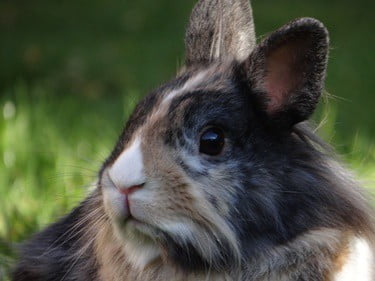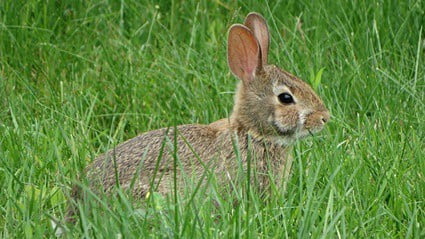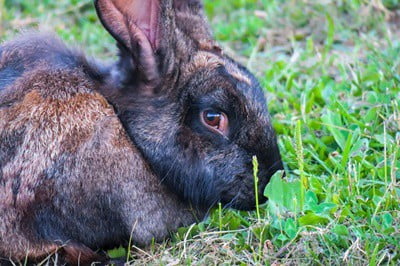Rabbits are easy to spook. This is often dangerous, since scared rabbits can injure themselves. As an owner, you’ve probably wondered how to spot a scared rabbit before it can cause harm. Bunnies show fear in several different ways. So long as you keep an eye on the signs, you can take action.
A scared rabbit will display fear through hiding, vocalizing, thumping, and breathing heavily. This may be accompanied by freezing behavior or shaking. Rabbits show fear when they feel in danger for their life or general well-being. While not dangerous in and of itself, that stress can eventually lead to health complications.
Start by calming down your scared rabbit. Give it space. Allow it to exercise its instinctual coping mechanisms. This may involve lying on the ground with it or letting it hide. You can also train your rabbit to be less fearful.
Why Are Rabbits So Fearful?
Rabbits are easy to frighten. Whether it’s from loud noises, other animals, or even humans, rabbits spook at the nearest sign of trouble. This is because rabbits are prey animals. A prey animal’s main method of survival is by avoiding predators. To do this, it has to be wary of its surroundings.
If a rabbit spots danger soon enough, it can flee. However, if it is too calm – and lets its guard down – that can be fatal. While it may sound excessive, being fearful is the key to sensing danger. A wild rabbit’s scared nature can be the key to its survival, especially for smaller breeds.
However, this unsettled nature can be a problem for domesticated rabbits. When kept as pets, a rabbit’s fearful personality can become a liability, instead of an asset. Scared rabbits may get stuck in small spaces, break their bones, or even run in areas where they aren’t allowed.
How Rabbits Show Fear
Each rabbit is different, and may be frightened by different things. Nonetheless, there are common ways for rabbits to signal that they are afraid. Keep an eye on these symptoms. It can help you keep your rabbit safe and in good health, both physically and mentally.
Freezing
Freezing is the most obvious sign of a rabbit’s fear. The bunny will go suddenly still and refuse to move.
Why do rabbits freeze in fear? When one spots danger from far away, its first instinct will be to immediately hold still. This makes it harder to spot for two reasons:
- Staying still helps it blend into its surroundings.
- Predators rely on motion to sense their prey, and staying still ensures that the rabbit isn’t spotted.
This response to danger is called the freeze response. Once the predator comes closer, or becomes a bigger threat, a rabbit will resort to other responses.

Shaking
Shaking is another common fear response in bunnies. You might find your rabbit trembling from head to toe.
Why do rabbits shake when scared? It’s due to a hormone called adrenaline. Adrenaline prepares the body to either flee or fight. To do this, it speeds up the contraction of muscle fibers, so that you are better equipped to run or throw attack. When an animal does neither, these contractions become trembling, or shaking.
Alternatively, this trembling can also be due to lower levels of glucose in the body. When the flight or fight response is triggered, glucose is diverted to the muscles. This results in a sudden drop of sugar in the blood, which, in turn, causes shaking.
Because rabbits are so small, these contractions can be very obvious. As such, bunny owners are often concerned. Don’t worry as this isn’t a serious health concern. Shaking is common with rabbits. They may also shake out of pain, stress, or even anxiety.
Hiding
Hiding is the main response of rabbits in order to avoid predators. Bunnies are extremely good hiders, able to squeeze into small spaces. Additionally, their senses are designed to scope out hiding spaces quickly. You’re probably familiar with your bunny sneaking into the tiniest of spaces.
Allowing your rabbit to hide is a great way to ensure that it calms down. If you think that your rabbit is looking for a place to hide, it’s best to provide one for its own health.
Thumping Feet
It may not be the most obvious sign of fear. Nonetheless, it’s a common and important signal for rabbits. When stomping from fright, rabbits will stand on all four feet, sometimes on the tips of their toes. Their ears will be raised up and alert. Then, they will thump both hind feet at the same time.
The speed or frequency of the thumps can vary. A rabbit may thump its feet every few seconds, or thump once every couple of minutes. It will often maintain this position until it believes the threat has disappeared. The rabbit may continue to thump for longer than an hour.
Thumping is a way for rabbits to communicate with other rabbits that there is danger. Unlike cats and dogs, rabbits can’t meow or bark. Instead, they use thumping as their version of clapping your hands to get attention. The message is clear: “Be on high alert.”
Even when there are no other rabbits nearby, a bunny will thump out of instinct. Other than to signal danger, thumping can also be a way to signal displeasure and nervousness.
Squealing And Grunting
Squealing isn’t always bad. Sometimes, rabbits squeal when they are happy. These are often accompanied by other happy behaviors, like binkying. Happy squeals are often pitched high.
However, when a rabbit squeals on a deeper register, this often signifies feeling scared. In addition, unhappy squeals are often accompanied by other negative signals. This can include trembling or heavy breathing.
Grunting itself may not signal a rabbit’s fear. However, grunting often means that your rabbit is unhappy. This may regard something minor, such as disliking the food that you’ve given, or it could be a sign of physical discomfort. All grunts should be noted, just in case.
Heavy Breathing
Of all fear responses, heavy breathing is perhaps the most concerning. Prolonged heavy breathing can be a symptom of health issues. In most cases, it’ll regard your rabbit’s heart.
If your rabbit’s breathing is heavy and labored, you may have more to worry about than just your rabbit being scared.
Common Rabbit Fears
It’s important to know when your rabbit is scared. However, it’s even better to avoid your rabbit becoming scared in the first place. If it displays any of the above signs, check out the bunny’s environment.
Predators
Rabbits of every kind fear predators. In medical circles, this fear is referred to as predator stress.
The most obvious instance of predator stress is when a prey animal, like a rabbit, sees a predator. However, predator stress can also be brought on by any type of exposure to predators. Of course, this includes the smell and sound of predators. It can also include environments wherein predators were previously spotted.
Rabbits have many predators. These include cats, dogs, various large birds, foxes, and weasels. Indeed, rabbits have a lot to be afraid of.
As such, when caring for your rabbit, it’s best to keep it away from other pets. You can also train your pet to behave properly around your rabbit. Always be cautious whenever you have a rabbit and a cat or dog in the same room.
This holds true even if your pet has the best intentions. No matter how much your cat or dog wants to be friends with your rabbit, it may still spook your poor bun. After all, dogs and cats often aren’t the gentlest of animals. Play-fighting can seriously harm a rabbit’s delicate bone structure. Loud barks and sharp nails can also cause ample stress on their own.
Loud Noises
Loud noises are also a common fear in rabbits. They have sensitive hearing and can detect noises with stunning clarity from far away. Loud sounds, therefore, can easily startle a rabbit.
Sounds that typically scare rabbits include construction work, fireworks, vacuums, loud music, and even noisy children. To address this, lessen the amount of noise that you’re producing near your bunny. If the noise is something you can’t control, try moving your rabbit to a quieter area.
Changes And Novelty
A rabbit will be easily stressed by changes in its environment. This includes new objects, new people, and even changes in its habitat.
If your rabbit seems off for seemingly no reason, a recent change may be the culprit. It could even be a minor problem, like changing your rabbit’s water bottle. Bigger changes, like moving to a new house, or accepting new members into the family, will take even longer to adjust to. In these cases, it’s best to introduce changes slowly and gradually.
Can Rabbits Die Of Fear?
While it may sound outlandish, rabbits can – and do – die of fear. How does this happen?
Heart Failure
According to Textbook of Rabbit Medicine, sudden death in rabbits is often caused by heart failures, brought on by stress. Stress, as a whole, can have dramatically negative effects on rabbits.
Gut Stasis
Stress may cause problems in digestion, specifically gut stasis, wherein the stomach cannot move food. It can also increase the formation of hairballs and put your rabbit at risk for other intestinal problems. Additionally, emotional stress can also result in arterial hypertension, and hypotension.
All animals have an adverse reaction to stress. However, there are animals that are more sensitive to stress. Rabbits are one of these stress-sensitive animals. According to Pathophysiology, sudden death is a typical outcome for stress-sensitive animals.
Nonetheless, while this is a typical response, there are still many approaches for owners to prevent it. The best tactic is to:
- Understand the common causes
- Know the symptoms
- Learn how to calm down your rabbit
Why Is My Rabbit Suddenly Scared?
You’re hanging out with your rabbit. Everything is fine. Then, all of a sudden, it freezes, begins to shake, or starts breathing heavily. What has scared your rabbit?
Occasionally, your rabbit may become frightened with no obvious trigger. There are no predators, no loud noises that you can detect, and no one has snuck up on the pet. In this case, it’s likely that your rabbit has heard something frightening.
A rabbit’s hearing is far more sensitive than ours. Your pet may have heard something that was loud for it, or something that it thought was dangerous. Alternatively, your rabbit could have also smelled something it disliked.
If your rabbit is suddenly skittish, there’s no need to worry. It will often return to its normal behavior soon. What’s important is that you:
- Give it space to run around
- Allow it to hide
- Provide comfort if it runs to you
- Ensure it can freely react to whatever spooked it
In the worst cases, your rabbit may not return to its old self right away. It may take a couple of days to recover. If your rabbit’s health seems to be affected, however, contact a vet.
How To Calm Down A Scared Bunny
If your bunny has been spooked, it’s wise to calm it down. However, you probably have a different idea of comfort than your pet bun. What’s comforting to you may only make your rabbit more afraid.

Don’t Pick Up Your Rabbit
Rabbits, by default, do not like being picked up. Doing this can trigger their flight-or-fight response. Some domesticated rabbits only accept the gesture after being socialized for it. If a rabbit is already afraid, this socialization can get thrown out the window.
Instead of picking up your rabbit, sit next to it. If your rabbit lets you, stroke its head gently. Give it toys, treats, and lots of attention.
Avoid Sudden Movements
For a rabbit that is already on high alert, sudden movements can make it even more afraid. Instead, move slowly, especially when you are close to your rabbit.
Whenever you are approaching, do so gradually. This can give your rabbit time to notice you and relax. You don’t want to sneak up on it by accident.
Sit or Lay On The Ground
To rabbits, humans are giants. Your bunny will be more comfortable if you are lower to the ground and closer to it. If your rabbit seems scared, try sitting down or lying on the ground. If your rabbit wants pets or cuddles to calm down, it will be more comfortable when you’re on the ground.
Surround with Familiar Objects And People
Rabbits do not like change. Your rabbit may be scared because of a new environment or new people. In this case, try surrounding it with familiar objects or people.
Talk Quietly
Rabbits do not like loud sounds. If your rabbit has been spooked, it’s best to talk in a hushed tone. Likewise, avoid loud noises so you don’t spook your rabbit further.
Allow Your Rabbit To Hide
If your rabbit shows signs of being scared, allow it a chance to hide. Rabbits will only grow more stressed if they can’t seek out their biggest form of comfort: avoiding the danger. When this happens, adrenaline can build up in the body and lead to complications.
Instead, allow your rabbit to hide for a while. If it’s in a cage, transfer it to a safe, open area where it can root around for a small place.
How To Stop Bunnies from Being Frightened
Some rabbits are less fearful than others. If your rabbit is easily spooked, you can take action. Begin with:
Socialization
Socialization refers to training animals to get used to human interaction. For rabbits, this mainly involves getting used to being handled. It can also include stuff like sudden movements, new people, and loud bangs.
For rabbits, socialization should occur at about 4-6 weeks of age. Older rabbits can still be socialized, but it may be harder to do, and less effective.
Desensitization
Desensitization refers to exposing rabbits to experiences that they might deem as threats. This allows them to learn that these experiences won’t cause pain. Eventually, they won’t have a fearful response to the situation.
However, desensitization can take a lot of time and effort to be effective. To make sure it works, it’s best to consult a vet.
As prey animals, scared rabbits prefer to run, hide, or hold still. In some cases, they may also try to alert other rabbits to the danger with thumping. In the worst cases, they may experience health complications from fear.
If your rabbit gets scared, let it work through the fear on its own terms. Give it time, space, and a place to hide. It’ll be happier for it.


My bun has ripped up the carpet and trying to dig a hole in the floor.
He has loads of toys hay love and free roaming. He has an outside run when the weather is good.
I understand their instinct to burrow ,what can I do to help him .